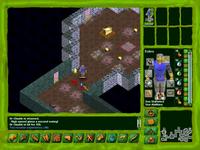|
|
|
Main News Forums Games Games Database Top 100 Release List Support Files Features Reviews Previews Interviews Editorials Diaries Misc Download Gallery Music Screenshots Videos Miscellaneous Staff Members Privacy Statement |
Random Dialogue: Massively Multiplayer Un-Games The mandate of our site is usually limited to Massively Multiplayer Games. Beyond that scope is an increasing number of virtual worlds built for very different purposes than pure hack and slash gaming. Education, socialization, even military training is occurring in virtual spaces nowadays. For text worlds this isn't news at all. Text-based MUDs, MUSHes and MUCKs have been used for purposes other than gaming almost as long as there have been text based world. Graphical worlds are another matter. Today I'm going to take a moment to talk about the realities of virtual worlds with nary an elf or alien in sight Massively Multistudent Learning Colleges across the country are already relying on web sites, forums, and mailing lists to connect students and facilitate communication. There has been at least one course that took place entirely within a commercial massively multiplayer game. Beyond that, individual interested in online learning have several options for that experience. There are several organizations running text based services for everything from ecological studies to foreign languages. Language studies in particular are enjoying a lot of success as virtual worlds because of the immersion factor available to the participants. Learning how to speak Japanese is a lot easier if you're interacting with a world labeled in Japanese and inhabited by fellow English speakers. On a smaller scale, some educators are using virtual spaces as performances spaces. Role-playing is effectively freeform writing. The immediacy of constructive criticism that can come from a MUSH log is hard to top in a real life scenario. As has already happened with more familiar internet technologies, pioneering instructors are looking to whatever tools are available to them in order to get their message across. But what about small communities with less purpose? Socialites of the Virtual World I will freely admit that while I was once a frequent visitor to IRC. Getting to know people in an abstract way has a lot of attraction when you're long on smarts but short on charm. With the way modern society has come together, there's also a lot to be said for the safety of a computer screen. Therefore the popularity of virtual spaces like There and Second Life are not surprising. People are gathering via the tools available to them in graphical and text based environments to form sub-societies based off of common interest. While this is an interesting use of virtual world technology, it's not a new concept. This has been going on since the internet got off the ground in forums, IRC chatrooms, and mailing lists. The only key differences are the levels of creativity that a virtual world can bring out. The ability to craft and create new content for the world, as in Second Life, allows for a level of personalization to the social space that you don't get in an IRC chatroom. MMOGs get serious Virtual worlds have been an interesting technology from a use perspective. The vast majority of MMOGs are commercial or independent fan run worlds. Only the last few years have virtual spaces been used for what are usually traditional roles of new technologies. Business oriented and military applications of virtual worlds are in the offing as I write this. Connected training systems for medical technologies, network setup and administration, and even virtual seminars are some of the uses I've seen mentioned for us in graphic virtual spaces. The military has seen Virtual Worlds as a training ground as well, and the virtual Kuwait City that There Inc has built for them will bear the brunt of simulated combats in the near future. Next time To be honest, I'm not sure what I'm going to talk about next week. As I've mentioned once or twice before, I'm looking forward to the possibility of getting into the World of Warcraft Beta (just like everyone else). Beyond that, I've got a couple of different topics I want to touch on. Check back next Monday to find out what I decide on.
|
|||
|
All original content of this site is copyrighted by RPGWatch. Copying or reproducing of any part of this site is strictly prohibited. Taking anything from this site without authorisation will be considered stealing and we'll be forced to visit you and jump on your legs until you give it back. |
||




